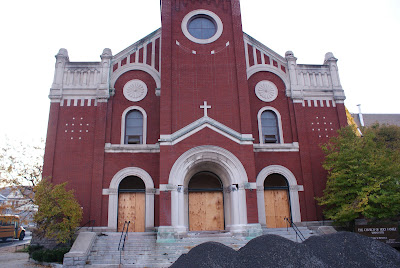I was at church a past Sunday, and as usual, the very young man who helps with the collection did his typical and joyful sprint after delivering the goods to the altar. That always makes me smile. It’s also a far cry from what I remember as a child, going to Holy Family Church in Scranton.
The biggest difference between then and now? Back then, there was no joy.
What we had instead was a clergy that was more interested in formality, rigidity and obedience. If “God is Love” (1 John, 4:8) then I’d be hard pressed to think that God was actually there. Granted that I see the need for managing the audience, if you will, back when church attendance was much higher, but this went well beyond the tactics of orchestrating large groups of humans. There was a tenable kind of feeling of obligation…of “doing it because you were told”…instead of really learning what, for example, what the Gospels could teach us about life 2000 years later.
Had that little boy done his joyful sprinting back then, well, there would have been stern words afterwards. Ponder that for a moment: A small child is genuinely happy to be at church and participating…so much so that he’s literally running with joy in his footsteps. And yet decades ago, this would have been met with disdain and likely anger. Maybe, just maybe, had a bit of joy been universally encouraged back then, perhaps some churches wouldn’t be in the attendance pickle that seems so very pervasive these days.
I do realize, by the way, that “things were different” when I was a child. Some of those differences were for the better then, such as the general pace of things. Today, well I know that things move too fast for some (that’s a different post for another day), and many seem like they are being left behind in our modern world. Some of those differences were definitely for the worse, such as how we treated the environment. Wait…those bad old day might be coming back. Anyway, the concept of being different is almost agnostic in that it can’t be proven to be better or worse when you look at everything combined. Different is simply different.
I will note that I don’t go to church every Sunday. Maybe twice a month. It all depends.
But when I do go, I think age has taught me lessons about priorities and what I really should be paying attention to at any given moment. Part of that is the sense of an actual, physical community, which is something that, in our increasingly virtual world, is becoming all too infrequent. Granted that I am not the greatest community member (that would involve interacting with humans a bit too much for me), but there is a kind of purity in having someone come up to you in church and ask you how you are doing. And sincerely mean it, by the way. Last but not least, I enjoy going to church with Ms. Rivers…it’s one of those “our time” kind of things. She’s more active in things than I am, so I’d like to think that I am kind of like her chief cheerleader, consigliere, and (really not needed) bodyguard.
To end this screed, and speaking of ending things, my church growing up, Holy Family in Scranton, was torn down years ago. I made it a point to document the demolition, a kind of monument, if you will, to things gone by.





